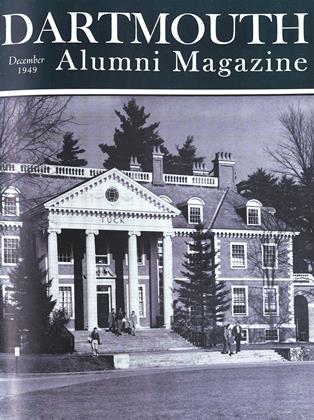by Richard Spong '36.William Sloan Associates, Inc.; 1949; 275pages; $3.
To realize the vast differences between World War I and World War 11, you need only read A. P. Herbert's The Secret Battle (Methuen, 1919), and Richard Spong's SeeIf He Wins. Both are stories of deserters, and both are excellent as psychological studies, and as pictures of the chaos in men's lives and characters resulting from war.
Mr. Spong writes with great competence, and with genuine compassion and understanding. His locale is Paris in the winter of 1944, a city of black marketeers and of confused, hungry, war-weary, inflation-plagued people. Tom Sword, a Dartmouth man of recent vintage, awaking after a classical hangover in the Rue Pigalle, becomes, through causes almost beyond himself, a deserter from the 973rd tank destroyer battalion. Teaming up with Spud, a big negro G.I., and Edouard Buchain, an admirer of Al Capone's empire of years gone by, Tom becomes engaged in at first small-time and then in big-time black market operations. His exciting story filled with "suspense and violence," including a somewhat sentimental love affair with Solange, unfolds to a catastrophic end with the inevitability of a Greek drama, and with a pace that carries the reader along almost breathless.
Mr. Spong has been around and knows of what he writes. He spent two and a half years in a tank destroyer battalion, and six months in counter intelligence. It is, on the whole, a tough book, unsuited to members of the Etna sewing circle, but war is tough, and is never suited for any sewing circle. The book reeks with authenticity; he has just the right nuance time and again. The characters are fully realized, and Dick has gone a long way since he got his B in English 41. This is a first novel that he and Dartmouth, too, can take pride in; a creative work of real excellence, able to stand up with the best recent books in the literature of war.
His flashback to the Hanover Plain was, I think, an error, and it is the only part of the book which for me pegged it as a first novel. I can understand that he felt he needed to bring this chapter in to make Tom's actions credible, but I do not think it was necessary. It is the one amateur part of the book; the rest is strictly professional.
Another Dartmouth man speaks for Tom: "He was as honest as they come If it could happen to him, it could happen, I guess, to anybody. I don't know, I guess it could happen to me."
And to all of us.
 View Full Issue
View Full Issue
More From This Issue
-
 Article
ArticleOUR GREATEST ISSUE
December 1949 By BRUCE W. KNIGHT -
 Article
ArticleNew Development Council Formed
December 1949 -
 Class Notes
Class Notes1923
December 1949 By TRUMAN T. METZEL, COLIN C. STEWART, JULIUS A. RIPPEL -
 Class Notes
Class Notes1918
December 1949 By ERNEST H. EARLEY, DONALD L. BARR, DAVID L. GARRATT -
 Class Notes
Class Notes1943
December 1949 By ELMER G. STEVENS JR., STANTON E. PRIDDY -
 Article
ArticleIt's An Old Spanish Custom of Speech
December 1949 By CHARLES L. YOUMANS '20
Herbert F. West '22
-
 Article
ArticleHanover Browsing
October 1936 By HERBERT F. WEST '22 -
 Article
ArticleHanover Browsing
May 1941 By HERBERT F. WEST '22 -
 Article
ArticleHanover Browsing
March 1942 By Herbert F. West '22 -
 Article
ArticleHanover Browsing
February 1947 By HERBERT F. WEST '22 -
 Article
ArticleHanover Browsing
June 1954 By HERBERT F. WEST '22 -
 Article
ArticleHanover Browsing
November 1955 By HERBERT F. WEST '22
Books
-
 Books
BooksBriefly Noted
JANUARY 1971 -
 Books
BooksHAROLD LLOYD'S WORLD OF COMEDY.
OCTOBER 1964 By CLIFF JORDAN '45 -
 Books
BooksFACULTY PUBLICATIONS
March, 1924 By David Lambuth -
 Books
BooksLITERARY MASTERPIECES OF THE WESTERN WORLD
October 1953 By FRANCIS L. CHILDS '06 -
 Books
BooksFEDERAL PROTECTION OF CIVIL RIGHTS,
April 1948 By LESTER B. GRANGER '18. -
 Books
BooksOUR ENVIRONMENT CAN BE SAVED.
FEBRUARY 1971 By ROBERT L. LOEB '21

